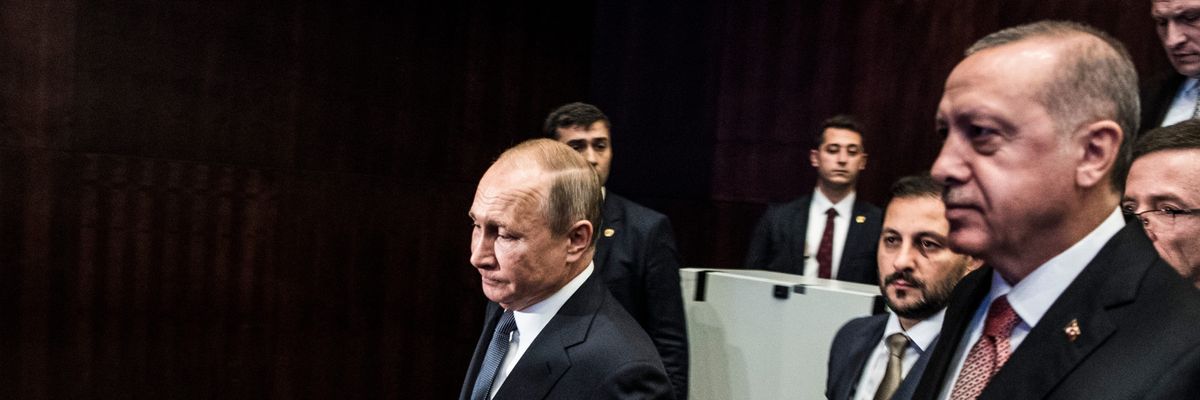The Biden administration has imposed sanctions on five Turkish companies and one Turkish national accused of helping Russia evade sanctions and supporting Moscow in its invasion of Ukraine, turning up the pressure on Ankara over its neutral stance on the Ukraine war.
“For the past 18 months, we’ve shared our concerns with the Turkish government and private sector and informed them of the significant risks of doing business with those we’ve sanctioned who are tied to Russia’s war,” a senior Treasury official said, according to Reuters. “These designations reflect our ongoing commitment to target individuals and entities who provide material support to sanctioned entities.”
The new round of designations — part of a larger sanctions package targeting a wide array of Russian entities — included Turkish companies Margiana Insaat Dis Ticaret and Demirci Bilisim Ticaret Sanayi, accused of facilitating the transfer of dual-use goods to Russia.
“Margiana’s shipments to [Russian-based entities] SMT-iLogic and Saturn EK have included High Priority Items of the kind recovered in multiple Russian weapons systems used against Ukraine, including the Kalibr cruise missile, the Kh-101 cruise missile, and the Orlan-10 UAV,” the Treasury Department said in a statement.
Ankara sharply broke ranks with its fellow NATO member states in the weeks following Russia's invasion of Ukraine, rejecting the West’s maximum pressure strategy against the Kremlin in an effort to position itself as a possible mediator between Moscow and Kyiv.
Not only has Turkey refused to participate in the Western sanctions regime, but Ankara’s trade relations with Moscow have boomed in the invasion’s aftermath. Reuters reported earlier in 2023 that Turkey’s exports to Russia jumped 262 percent year over year, reflecting the stark degree to which Ankara has profited from the vacuum caused by the withdrawal of Western economic actors from Russian markets.
Moscow and Ankara have even agreed on the construction of a new gas hub on Turkish territory that would provide Russia with alternate supply routes for gas exports, though the ambitious project is apparently being held up by management disputes.
Russia’s economy has proven highly resilient against successive waves of U.S. and EU sanctions packages in large part because it has maintained and even deepened trade ties with much of the non-western world, notably including Turkey, key Middle Eastern actors, and the other BRICS countries. The Biden administration has sought to tighten the screws on Russia by levying secondary sanctions on Chinese, UAE, Turkish, and other entities accused of helping Moscow acquire advanced technology and other goods that U.S. officials say can be used to bolster the Russian war effort in Ukraine.
Turkish President Recep Tayyip Erdogan has built a political brand, cemented well before the 2022 Ukraine invasion with his decision to import S-400 missile defense systems from Russia, as a swing player between Russia and the West. Erdogan has proven adept at exploiting the geopolitical leverage afforded by Turkey’s position as a strategically situated Eurasian crossroads, maneuvering between Moscow and Western capitals to advance a ruthlessly pragmatic foreign policy vision that flouts and occasionally even defies broader NATO objectives.
The Ukraine war has provided Erdogan with a surfeit of opportunities to advance this signature brand of statesmanship. Rushing to fill the diplomatic void left by Western states pursuing a maximum-pressure strategy against Moscow, Turkey has cemented its status as one of the war’s most important brokers with its role in hosting the ill-fated Spring 2022 Russia-Ukraine peace talks and implementing the Black Sea Grain Initiative, better known as the Ukraine grain deal.
It appears unlikely that Erdogan will be dissuaded from his nonaligned stance by this latest round of secondary sanctions, which follows a similar set of designations announced in April 2023; nor is there any indication that the Biden administration is contemplating upping the ante with more direct punitive actions against Ankara.
Turkey is poised to continue reaping the benefits of surging trade with Russia, but, with the grain deal recently “terminated” by Moscow and Erdogan himself admitting that there are no “promising prospects of peace” between Russia and Ukraine on the heels of an uneventful meeting with Vladimir Putin earlier this month, Ankara is finding it increasingly difficult to fill its desired mediator niche in a war that both sides say could go on for years.
The designations come at a tense moment in U.S.-Turkish relations, with Washington seeking Turkey’s swift ratification of Sweden’s NATO membership application and Ankara hoping to finalize the looming sale of Lockheed Martin F-16 fighter jets to Turkey. Erdogan has objected to what he described as President Joe Biden’s desire to condition the F-16 sale on Ankara greenlighting Sweden’s NATO bid, insisting that the decision is up to Turkey’s parliament and blaming Stockholm for not doing more to extradite Kurdistan Workers' Party (PKK) militants labeled as “terrorists” by the Turkish government. The timeframe for both decisions remains uncertain.
- Diplomacy Watch: Sweden gets NATO, Turkey gets F-16s? ›
- Is anyone happier about Menendez's demise than Erdogan? - Responsible Statecraft ›














